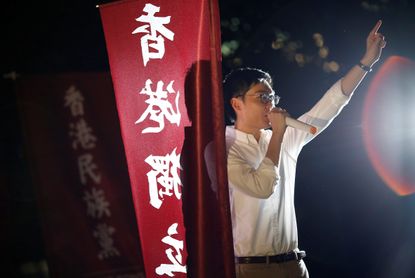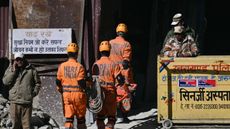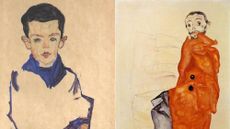Can Hong Kong break free of China?
It certainly won't be easy. But there are real signs of change.


Hong Kong is a historical accident. China had to give up what was then a mostly empty island to Britain after losing the First Opium War in 1842. The tiny island grew to become one of the world's most thriving metropolises as the U.K. established a benevolently deregulated economy that enabled exiles from Communist China to build one of the world's most bustling business centers. Hong Kong became an economic powerhouse; today it has a population of more than 7 million and the world's 10th highest GDP per capita (on a purchasing power parity basis). But it has also been a cultural beacon, hosting thriving religious organizations that couldn't prosper in China, and producing an iconic and influential movie industry.
When the U.K. handed over Hong Kong to China in 1997, pursuant to the original lease from the 19th century, China promised to respect Hong Kong's historical liberties under the "One Country, Two Systems" concept. The idea was that Hong Kong would become a part of China, but have its own constitution and its own political system, including civil liberties.
Anyone who trusted that promise was smoking something.
Subscribe to The Week
Escape your echo chamber. Get the facts behind the news, plus analysis from multiple perspectives.

Sign up for The Week's Free Newsletters
From our morning news briefing to a weekly Good News Newsletter, get the best of The Week delivered directly to your inbox.
From our morning news briefing to a weekly Good News Newsletter, get the best of The Week delivered directly to your inbox.
And indeed, China has recently been cracking down. In 2014, a decision by the Chinese Communist Party to start vetting candidates for elections prompted the "umbrella movement," a series of sit-ins and protests that froze the city for months. More recently, Chinese dissidents living in Hong Kong, who used to be able to rely on safety, have been running into "accidents" — or disappearing. Most famously, Lam Wing-kee, a seller of books critical of China, disappeared, and was only allowed to return to Hong Kong after months of detention and alleged torture.
The latest crackdown from the Chinese government has caused a severe backlash from the umbrella movement. And it's causing a major shift. Hong Kong reformers have always agitated only for maintaining Hong Kong's liberties within China. Now, a growing number of voices are advocating what should have been the goal all along: Hong Kong independence.
The South China Morning Post frets that teachers in Hong Kong might advocate independence to their students, and the government says that teachers who advocate independence will be sacked, a sure sign of fear. The Chinese government is also warning that candidates for the Legislative Council, Hong Kong's semi-elected parliament, who support independence will face "follow-up action".
This is a really big deal. Barely a year or two ago, the Hong Kong independence movement was a joke. Literally. People made a joke flag and a joke website for the Hong Kong independence movement.
Now the independence movement is real. It's fielding candidates for office, and has a secret membership list. Today, people are marching with Hong Kong's colonial-era flag, and the "dragon and lion flag," which displays Hong Kong's colonial-era arms, symbols for a return to independence.
The movement is still fringe, and there hasn't been serious polling on it. But the demographics of the Hong Kong pro-democracy movement are changing. Younger citizens feel that the traditional pro-democracy parties have accomplished nothing, and younger activists don't want to work through the process anymore. They want to protest, sit-in, perform street action, and get arrested. A recent poll found the number of Hong Kong residents who say they "feel Chinese" has dropped to a record low.
The pro-independence movement has a very difficult road ahead of it. To say China is irredentist is to put it mildly. It still hasn't gotten over Taiwan's independence decades ago, still claims Taiwan as a part of China, and breaks off diplomatic relationships with any country that recognizes Taiwan. Hong Kong cannot win independence militarily, and for it to win independence through peaceful means would mean a willingness on the part of China to refuse a crackdown for political or PR reasons that it has never, ever shown. Xi Jinping's government, far from embracing a putative trend toward a political opening in China following the economic opening, has concentrated power and embraced authoritarianism to an extent unseen since at least Tian An Men. A Chinese prosecutor's office darkly warned that Hong Kong independence would turn the peninsula "into Syria".
And yet... China is an unstable country. And in a world of Brexit and Trump for president, anything is possible. Black swans can and do happen.
More broadly, the Hong Kong independence movement shows that this beautiful city has spine and spunk. It is right. City-states are the future. And Hong Kong is more Hong Kong than China at this point. It has its own history, its own culture, its own people, its own problems. Long live Hong Kong independence.
Create an account with the same email registered to your subscription to unlock access.
Sign up for Today's Best Articles in your inbox
A free daily email with the biggest news stories of the day – and the best features from TheWeek.com
Pascal-Emmanuel Gobry is a writer and fellow at the Ethics and Public Policy Center. His writing has appeared at Forbes, The Atlantic, First Things, Commentary Magazine, The Daily Beast, The Federalist, Quartz, and other places. He lives in Paris with his beloved wife and daughter.
-
 Taliban's quest for tourists to see the wonders of Afghanistan
Taliban's quest for tourists to see the wonders of AfghanistanUnder The Radar Troubled country wants to become a 'tourism powerhouse' – but how safe is it?
By Chas Newkey-Burden, The Week UK Published
-
 Magazine solutions - May 17, 2024
Magazine solutions - May 17, 2024Puzzles and Quizzes Issue - May 17, 2024
By The Week Staff Published
-
 Magazine printables - May 17, 2024
Magazine printables - May 17, 2024Puzzles and Quizzes Issue - May 17, 2024
By The Week Staff Published
-
 Puffed rice and yoga: inside the collapsed tunnel where Indian workers await rescue
Puffed rice and yoga: inside the collapsed tunnel where Indian workers await rescueSpeed Read Workers trapped in collapsed tunnel are suffering from dysentery and anxiety over their rescue
By Sorcha Bradley, The Week UK Published
-
 Gaza hospital blast: What the video evidence shows about who's to blame
Gaza hospital blast: What the video evidence shows about who's to blameSpeed Read Nobody wants to take responsibility for the deadly explosion in the courtyard of Gaza's al-Ahli Hospital. Roll the tape.
By Peter Weber, The Week US Published
-
 Giraffe poo seized after woman wanted to use it to make a necklace
Giraffe poo seized after woman wanted to use it to make a necklaceTall Tales And other stories from the stranger side of life
By Chas Newkey-Burden, The Week UK Published
-
 Helicopter sound arouses crocodiles
Helicopter sound arouses crocodilesTall Tales And other stories from the stranger side of life
By Chas Newkey-Burden, The Week UK Published
-
 Woman sues Disney over 'injurious wedgie'
Woman sues Disney over 'injurious wedgie'Tall Tales And other stories from the stranger side of life
By Chas Newkey-Burden, The Week UK Published
-
 Emotional support alligator turned away from baseball stadium
Emotional support alligator turned away from baseball stadiumTall Tales And other stories from the stranger side of life
By Chas Newkey-Burden, The Week UK Published
-
 Europe's oldest shoes found in Spanish caves
Europe's oldest shoes found in Spanish cavesTall Tales And other stories from the stranger side of life
By Chas Newkey-Burden, The Week UK Published
-
 Artworks stolen by Nazis returned to heirs of cabaret performer
Artworks stolen by Nazis returned to heirs of cabaret performerIt wasn't all bad Good news stories from the past seven days
By The Week Staff Published